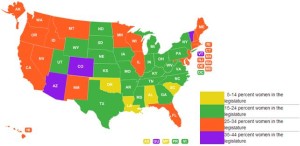>> BY ANN CARROLL It’s back to work today for our state lawmakers in Raleigh – and man, do they have a lot of ‘splainin’ to do. Last session, they brutally slashed funding for health care, education, public benefits and more – but that’s another story.
BY ANN CARROLL It’s back to work today for our state lawmakers in Raleigh – and man, do they have a lot of ‘splainin’ to do. Last session, they brutally slashed funding for health care, education, public benefits and more – but that’s another story.
Today, the General Assembly will fill with fresh haircuts, updated iPhones, and the dull thud of men’s dress shoes – interspersed rarely with a lone clickity-clack of a woman’s high heels.
With 37 women representatives in total, women make up just over 21% of our state legislators. This >>awesome map compares gender equality in the North Carolina legislature with other states’… Our green coloring doesn’t exactly mean “go” for women. Our measly percentage of women in power puts us ahead of some other southern states, but we lag woefully behind some western states where as many as 44% of state lawmakers are women.
The inequalities don’t stop there: North Carolina women lack equal representation on the national scale. Women make up only 18% of the US House. Compare that to other democratic countries worldwide where women make up an average of 21% of governing bodies. The Center for American Progress ranks the >>US 60th in women’s political empowerment on the Gender Gap index. So much for our progressive trailblazing! But America didn’t lead the world in equality when women’s suffrage began; take a look at this >>long list of countries that beat America to the punch when it came to letting women step up to the ballot box.
So what difference does it make? Men and women care about different things. I think about my own household: I know exactly what goes on in my girls’ classrooms and the date of their next doctor’s visit. My husband, meanwhile, is strategizing his next business move so that he can one day “rule the world.” Women and men develop different priorities because of how we grow up, watching and learning from our parents. It doesn’t have to be this way – but I look around at my friends and, for better or for worse, that’s how the division of labor breaks down. I firmly believe that women can accomplish all that men do – and multi-task like no one’s business while doing it.
As women, we have different priorities, and those serve as an asset to policy development. Plus, our perspectives on health care and education often come from our personal experiences as a caregiver. In a position in which you need to care for a whole city, state, or county, a background in caregiving comes in handy.
So how do women get there? We need to put ourselves out there. I feel slightly hypocritical in saying that because I don’t see myself putting my name on a ticket any time soon, but more of us need to believe in ourselves enough to throw our names in the hat.
If you don’t want to run for office, you can support the women who have already invested in their own political career. Check out >>Lillian’s List of NC; they find, train, and support progressive women running for public office in North Carolina.
Beyond that, we all need to push back against some of the dialogue that surrounds women in leadership. I visibly fumed when our cable “news” networks (–don’t get me started on that one–) hijacked the announcement of Chelsea Clinton’s pregnancy to wonder whether or not Hillary Clinton will be too old run for president in 2016. Are you serious? She’ll be 68. Ronald Reagan was 69 at his presidential inauguration and he helped put an end to the Cold War.
Beyond age, women in power must contend with the “bitch” factor. When women act assertive and cut-throat, >>they get called “bitches.” When men take the same approach, they get called “leaders.” We all need to start kindly reminding people that the use of the term “bitch” is not only crude and unnecessary; it’s sexist. You’ll probably get called the b-word for calling someone out– but hey; you’ll be in good company.
Whether or not you take my two cents on how to get more women in leadership, we all need to keep a keen eye on the state legislature this session. According to rules of the State Assembly, our legislators cannot introduce new bills during a short session – but they can doctor existing proposals to include whatever they want. I have it on good authority that the General Assembly will discuss >>our state’s coal-ash problem. Study after study confirms the fact that women tend to run households – and it’s high time that we started running our state.

There are no comments
Add yours